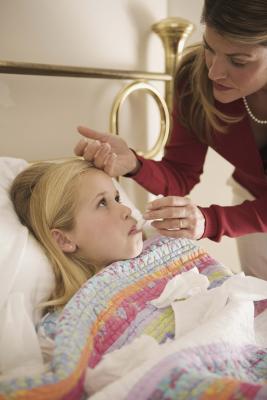Fevers accompany many childhood illnesses, from influenza to meningitis. A fever is the natural response to fend off an illness and often does not need any medical attention. The fever can sometimes signal a serious illness that needs medical attention. A call to your child’s doctor helps determine if the fever is severe enough to warrant a visit to the doctor.
High Temperature
A temperature that climbs over 100 degrees starts to worry many parents. Unless other conditions or symptoms coincide with the fever, you probably don’t need to call the doctor until the fever reaches 103 degrees. If your child’s fever is below 103 degrees, evaluate the other factors to determine the need for a call.
Behavior
Your child’s behavior during a fever helps determine the severity and need for medical attention. In general, if your child is acting and eating normally during the fever, there is less need for concern. A child who stops his normal activities with the fever might need medical attention. Watch for irritability without being able to console your child. Limpness in the body and a lack of response from your child during the fever is another cause for concern and worth a call or visit to the doctor.
Age
Young infants with a high fever need medical attention. According to Ask Dr. Sears, a rectal temperature of 101 or higher in a baby under 7 weeks old is cause for immediate evaluation by a doctor. Babies 7 weeks and older with a fever of 101 or higher warrants a call to the doctor. A high fever in a younger baby can be more serious, so don’t hesitate to call your newborn’s doctor when her temperature rises near 101 degrees.
Other Symptoms
Other symptoms that accompany your child’s fever help determine the need for a call to the doctor. Changes in breathing, such as labored or fast breathing, could mean your child is developing something more serious, such as pneumonia. Babycenter also notes that purple-red spots or large purple areas on the skin could indicate a bacterial infection. A high fever accompanied by neck stiffness, pain, vomiting and headache could indicate meningitis. Other symptoms accompanying fever that warrant a call to the doctor include severe coughing, vomiting or diarrhea, especially if they don’t subside.
Febrile seizures are another side effect that needs a call to the doctor. While generally not serious, a seizure that occurs during a high fever should be evaluated by your child’s physician.
Considerations
Your child’s doctor or nurse needs as much information as possible to assess your child’s situation over the phone. Keep track of your child’s fever, including when it started and how high it is. You should also share any other symptoms your child shows, as well as his appearance and behavior.





